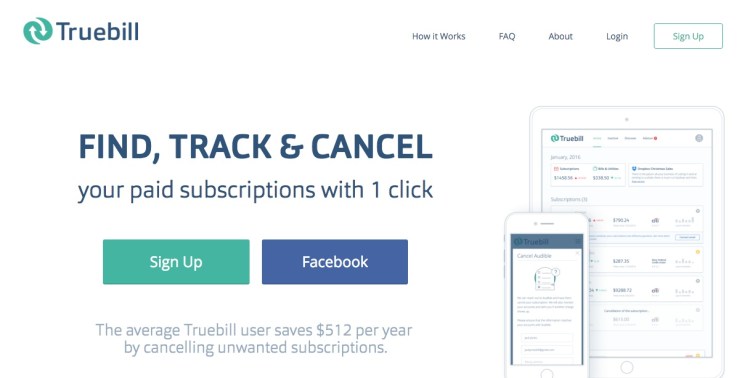It has happened to all of us at one time or another: You scan your credit card bill and notice some phantom $7.99 monthly charge for some service you had signed up for months or maybe even years earlier.
Now you face a dilemma: Do you sink the time into tracking down the website, remembering how to access your account, and then jumping through all the hoops necessary to cancel the subscription? Or do you set the bill aside and put the cancellation on your mental to-do list, where it will be forgotten for several more months?
Truebill feels your pain. And it wants to help.
The graduate of the most recent Y Combinator class has launched a service that wants to be a one-stop hub to manage all of your online subscriptions. And in an era when companies are increasingly moving toward subscription services and away from one-time downloads or purchase, the founders believe there is a huge opportunity ahead.
“It seemed like half the people we knew had this situation where they had forgotten about subscriptions,” said Truebill CEO Yahya Mokhtarzada. “We got to work building an algorithm that could scan your credit card to find them.”
The company was cofounded by Mokhtarzada and his brother, Idris. The pair sold a previous startup, Webs.com, to Vistaprint in 2011 for $117 million.
While hunting around for a new idea, Yahya Mokhtarzada noticed a charge for $40 on his credit card for Gogo in-flight Wi-Fi. He had signed up for the service without realizing he was agreeing to an ongoing subscription. In fact, he had been charged for several months before realizing it.
Truebill aims to help people stay on top of these charges and makes it easy to cancel them with one click.
Users can link their credit card and bank accounts to Truebill, which scans and identifies ongoing monthly charges. It then gives users the option to say they wish to cancel a service. If a user clicks “yes,” Truebill offers to take care of the rest.
Of course, at the start, this can still be labor intensive. Someone at Truebill still has to walk through the steps for each service in order to understand how the cancellation process works. And they may have to come back to the user to ask for additional information to complete the task.
In some cases, the process does indeed get cumbersome. For instance, many gyms will insist that someone physically come into an office to cancel a membership or send a certified letter. So Truebill wrote software to generate and send certified letters.
But once a cancellation is achieved, Truebill adds the steps taken to a database designed to automate the process as much as possible going forward, Yahya Mokhtarzada explained.
The product launched publicly at the end of January. The company said that so far, 16 percent of people who have signed up have canceled at least one subscription, and on average those who cancel something have saved $512.
The scanning and cancellation part of the service is free to users. The company plans on making money by also offering a discovery and management service to help people sign up for other subscription services.
The idea is that if users feel it’s easier to manage all their subscriptions in one place, they’ll be more comfortable signing up for new ones. And when they do, partners will pay a fee to Truebill.
“We want to remove as much friction as possible from the subscription process,” Yahya Mokhtarzada said.
Like all Y Combinator graduates, Truebill received $120,000 upon completion of the program. And the company will be looking to raise more as it begins to hire out a team and seeks to add more banks, credit cards, and eventually, companies that offer subscriptions, Yahya Mokhtarzada said.
VentureBeat's mission is to be a digital town square for technical decision-makers to gain knowledge about transformative enterprise technology and transact. Learn More

